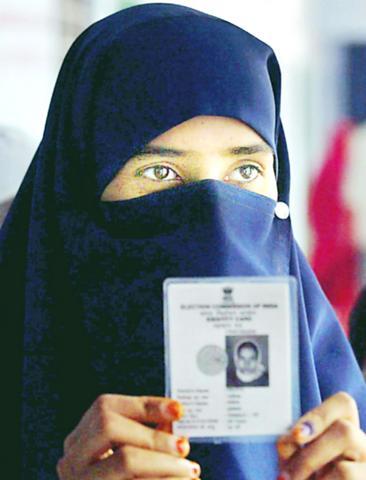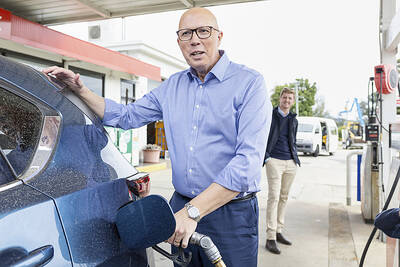Separatist violence erupted in disputed Kashmir as India's national election entered a decisive phase yesterday with signs the ruling Hindu nationalists are clawing back lost ground.
At least one person was killed and several injured in grenade attacks overnight and through the day in Anantnag, the only Kashmiri seat among 83 being contested in the fourth and second-last round of the world's largest democratic exercise.

PHOTO: AP
More than 100 million people are eligible to vote in seven states, including Prime Minister Atal Behari Vajpayee, who sought a strong mandate for a new term as he cast his ballot in Uttar Pradesh, the most populous and politically pivotal state.
"I want voters to come out in large numbers to cast their votes," he said, dressed in white kurta pyjama -- traditional long shirt and baggy trousers -- and black leather sandals. Asked if his coalition would defy opinion and exit polls and retain its majority in the 545-seat lower house, Vajpayee smiled and said: "Yes. I am confident."
Although police fired warning shots and tear gas to disperse separatist protesters in Kashmir, voting was largely peaceful elsewhere as Vajpayee's Bharatiya Janata Party (BJP)-led coalition fights for a majority.
Voters began trickling into polling stations at 7am, from Kashmir and the crucial northern Hindi heartland of Uttar Pradesh to the sweltering deserts of Rajasthan and the wild tribal regions of remote northeastern states.
"I'm not afraid of anybody. I have been using my vote in the past and I'll use it this time," said 50-year-old Abdul Rahman, one of only a handful of voters on the almost deserted streets of Kashmir's Anantnag town, before the fresh attacks.
"I am voting because maybe it may change our state -- violence and poverty have made our lives miserable," said Anantnag housewife Shabnum Bano. Militants and separatist leaders have called a boycott of the vote, as in previous rounds.
In Vajpayee's seat, early morning walkers and joggers in shorts and T-shirts dropped into polling stations to vote.
"I am voting for Atal the PM, not Atal the MP. The others are all crooks," said retired central bank worker P.C. Mehrotra.
This phase, focused on the northern "cow belt," is the last real chance for the BJP to cement its position in parliament.
It has little presence in the more than 180 seats in next week's final round, in which it will rely on regional allies.
After exit polling from last week's third round showed Vajpayee and his allies struggling to win a majority, opinion polls this week had them edging closer to the 273 seats needed.
Financial markets, worried Vajpayee might roll back on critical economic reforms if forced to haggle with minor parties for support, were encouraged.
The main Bombay index, which fell sharply on the exit polls last week, edged up after a one percent rise on Tuesday. Fourth-round exit polls will be issued after voting ends at 5pm.
There is little doubt the BJP will emerge the largest party in the new parliament and the front runner to form the next government. Counting and results are due on May 13.
Vajpayee, 79, called the election six months early to cash in on his personal popularity, a strong economy, improving ties with old foe Pakistan and a bumper harvest after a good monsoon.
Instead, his "India Shining" campaign has failed to resonate among the hundreds of millions of impoverished rural Indians who feel left out of the economic boom.
The latest opinion polls show Vajpayee and his allies winning 245 to 279 seats, better than the low of 235 forecast by one survey last week but still below their 306 in the 1999 election.
The election, staggered over three weeks to allow security forces to move from one hotspot to another, has failed to fire the enthusiasm of many of India's 670 million eligible voters.

‘EYE FOR AN EYE’: Two of the men were shot by a male relative of the victims, whose families turned down the opportunity to offer them amnesty, the Supreme Court said Four men were yesterday publicly executed in Afghanistan, the Supreme Court said, the highest number of executions to be carried out in one day since the Taliban’s return to power. The executions in three separate provinces brought to 10 the number of men publicly put to death since 2021, according to an Agence France-Presse tally. Public executions were common during the Taliban’s first rule from 1996 to 2001, with most of them carried out publicly in sports stadiums. Two men were shot around six or seven times by a male relative of the victims in front of spectators in Qala-i-Naw, the center

Canadian Prime Minister Mark Carney is leaning into his banking background as his country fights a trade war with the US, but his financial ties have also made him a target for conspiracy theories. Incorporating tropes familiar to followers of the far-right QAnon movement, conspiratorial social media posts about the Liberal leader have surged ahead of the country’s April 28 election. Posts range from false claims he recited a “satanic chant” at a campaign event to artificial intelligence (AI)-generated images of him in a pool with convicted sex offender Jeffrey Epstein. “He’s the ideal person to be targeted here, for sure, due to

DISPUTE: Beijing seeks global support against Trump’s tariffs, but many governments remain hesitant to align, including India, ASEAN countries and Australia China is reaching out to other nations as the US layers on more tariffs, in what appears to be an attempt by Beijing to form a united front to compel Washington to retreat. Days into the effort, it is meeting only partial success from countries unwilling to ally with the main target of US President Donald Trump’s trade war. Facing the cratering of global markets, Trump on Wednesday backed off his tariffs on most nations for 90 days, saying countries were lining up to negotiate more favorable conditions. China has refused to seek talks, saying the US was insincere and that it

Australia’s opposition party yesterday withdrew election promises to prevent public servants from working from home and to slash more than one in five federal public-sector jobs. Opposition leader Peter Dutton announced his conservative Liberal Party had dropped its pledge that public servants would be required to work in their offices five days a week except in exceptional circumstances. “I think we made a mistake in relation to this policy,” Dutton told Nine Network television. “I think it’s important that we say that and recognize it, and our intention was to make sure that where taxpayers are working hard and their money is